You may have heard about a special peptide called BPC-157. People say it can heal many things, like sports injuries and leaky gut. But what exactly is it? Is it even safe to use? And could it actually live up to all the hype?
It’s common to feel unsure about new ‘cure-all’ trends in wellness. Many people have mixed feelings about them. Everybody’s trying to sell you the next big thing these days.
But BPC-157, or its kosher alternative that we’ll talk about, is worth looking into. The scientific evidence supporting its healing and protective abilities is quite convincing.
This guide will explain everything about BPC-157, like where it comes from, how it works, its benefits, safety, and how to use it properly. By the end, you’ll be able to decide if adding BPC-157 to your health routine is right for you.

What is BPC-157?
Definition and origins
BPC-157 is a synthetic peptide made from a protein found naturally in stomach gastric juice. Yes, you read that right – this “miracle” healing agent was inspired by the digestive fluids in our own bellies!
In the 1990s, researchers at the University of Zagreb in Croatia made a significant discovery. They were studying protective substances in the gastrointestinal lining when they stumbled upon BPC-157. By isolating a partial sequence of the “Body Protection Compound,” they created the 15-amino acid peptide now known as BPC-157. [1]
Chemical structure and stability
From a technical standpoint, BPC-157 is a pentadecapeptide consisting of 15 amino acids in its sequence. Its chemical structure is highly stable and resistant to being broken down by enzymes in the body.
Due to its exceptional stability, BPC-157 can effectively travel throughout the body and exert its effects systemically. This applies whether it’s administered orally, injected, or used topically. Its half-life is estimated to be around 6-7 days in humans. [2]
Mechanism of action at the cellular level
So how exactly does this peptide work its apparent “magic”? The mechanisms of action are multi-faceted:
- BPC-157 starts the repair process in our body by waking up special cells. These cells rush to where the injury is and help heal it faster.
- BPC-157 works in two ways. First, it helps calm swelling in the body. Second, it helps create new blood paths. This helps blood flow better and brings more oxygen and nutrients to where they’re needed. [3]
- BPC-157 boosts important growth helpers like VEGF. These helpers are key for cell health, growth, and movement during healing. [3]
- It shields against damage from oxidative stress and fights off toxins, keeping cells and tissues in good shape. [4]
Essentially, BPC-157 enhances and optimizes the body’s natural healing and protective mechanisms.
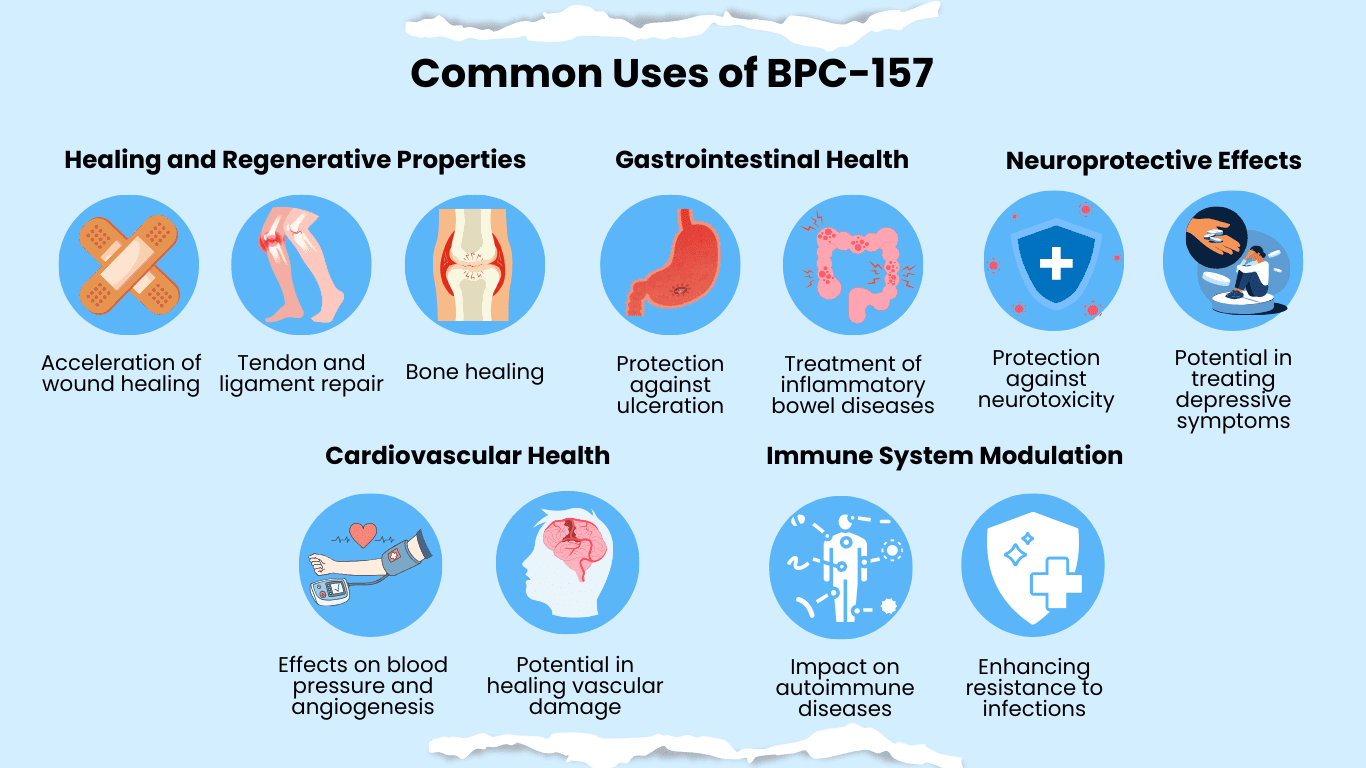
What is BPC-157 Commonly Used For?
Given its broad impact on key body processes, it’s no wonder BPC-157 could be helpful for many health issues.
Here are some of the most promising areas:
1. Healing and Regenerative Properties
Acceleration of wound healing
Many studies show that BPC-157 can quickly heal tough wounds, burns, and serious injuries. It works well for healing everything from skin cuts to corneal burns. [5]
Tendon and ligament repair
BPC-157 is well-known for quickly healing sprains, tears, and other injuries to soft tissues like tendons and ligaments. Many reports show it leads to faster and fuller recoveries with less scarring. [6]
Bone healing
Studies in animals suggest BPC-157 helps form calluses and grow bones back together after breaks. Research on its effects in humans is still developing. [7]
2. Gastrointestinal Health
Protection against ulceration
Since BPC-157 comes from a compound that protects the stomach, a lot of research has looked at how it can heal stomach and intestinal ulcers. It also helps prevent more harm from NSAIDs (pain relievers that don’t have steroids) and other issues. [8]
Treatment of inflammatory bowel diseases (IBD)
Trials in animals and humans show BPC-157 might help treat inflammation problems like Crohn’s, colitis, and “leaky gut.” It works by reducing inflammation and repairing the lining of the gut. [9]
3. Neuroprotective Effects
Protection against neurotoxicity
Early studies suggest BPC-157 can protect brain cells from toxins and might even help grow new ones. This is promising for treating conditions like Alzheimer’s, Parkinson’s, or recovering from injuries. [10]
Potential in treating depressive symptoms
Animal studies link BPC-157 to mood-lifting and anxiety-reducing effects. More studies are needed to see if it can help with mood disorders. [11]
4. Cardiovascular Health
Effects on blood pressure and angiogenesis
BPC-157 has been shown to act as both a vasodilator and angiogenic agent. It works to widen blood vessels and encourage new blood vessel growth. This can lower blood pressure and is good news for heart health. [12]
Potential in healing vascular damage
BPC-157 helps grow new tiny blood vessels and protects the inner walls of blood vessels. This can help fix or reduce damage from conditions like hardening of the arteries or diabetes.
5. Immune System Modulation
Impact on autoimmune diseases
BPC-157’s anti-inflammatory and immune system-balancing effects might offer new treatment possibilities for autoimmune diseases such as rheumatoid arthritis and multiple sclerosis. [13]
Enhancing resistance to infections
BPC-157 may help boost immune defenses and resist bacterial, fungal or viral infections – a promising area for future research.
Is BPC-157 Safe?
With such a long list of potential benefits, the million dollar question is: Is BPC-157 actually safe to use, especially long-term? Let’s look at what the research says:
Summary of clinical studies and research data
Most data on BPC-157 comes from tests on animals. However, it has also been studied in humans, mainly for healing purposes such as fixing tendons after ACL surgery. [14]
When taken orally or systemically at therapeutic doses, BPC-157 showed a good safety record. No serious side effects were reported in several trials. But remember, these studies were mostly short-term.
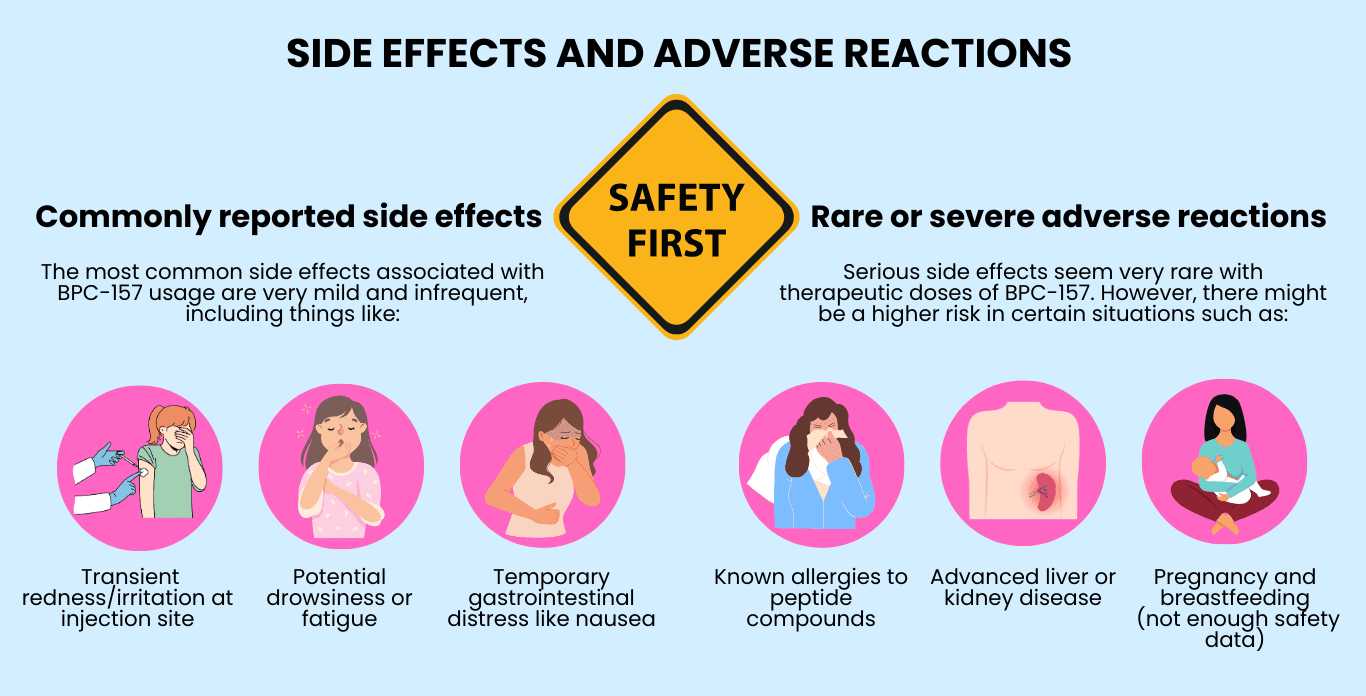
Side effects and adverse reactions
Commonly reported side effects
The most common side effects associated with BPC-157 usage are very mild and infrequent, including things like:
- Transient redness/irritation at injection site (topical is better tolerated)
- Potential drowsiness or fatigue
- Temporary gastrointestinal distress like nausea
Rare or severe adverse reactions
Serious side effects seem very rare with therapeutic doses of BPC-157. However, there might be a higher risk in certain situations such as:
- Known allergies to peptide compounds
- Advanced liver or kidney disease
- Pregnancy and breastfeeding (not enough safety data)
Interactions with other substances
Drug interactions
There aren’t any significant known interactions between BPC-157 and other drugs. Still, it’s a good idea to inform your doctor about any medications or supplements you’re using. This helps them assess any possible risks.
Dietary considerations
Using BPC-157 orally is usually safe with most foods and drinks. Yet, drinking alcohol might reduce its effectiveness, so it’s best avoided during treatment.
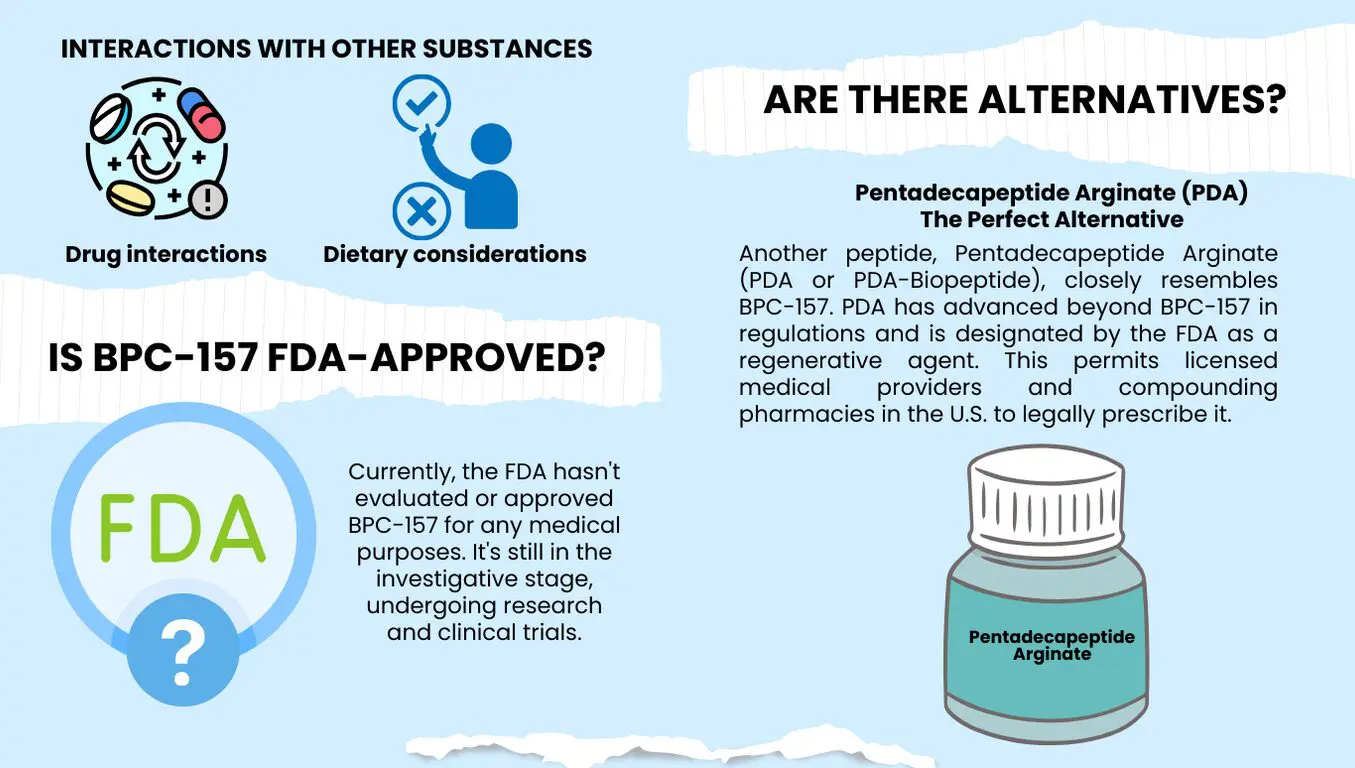
Is BPC-157 FDA-Approved? Are There Alternatives?
FDA stance on BPC-157
Currently, the FDA hasn’t evaluated or approved BPC-157 for any medical purposes. It’s still in the investigative stage, undergoing research and clinical trials.
Pentadecapeptide Arginate (PDA) – The Perfect Alternative
Yet, there’s another peptide called Pentadecapeptide Arginate (PDA or PDA-Biopeptide), closely resembling BPC-157. PDA has progressed ahead of BPC-157 in regulations. It’s the same version with the same 15 amino acid sequence as BPC-157, but with an added arginate salt for better stability.
Importantly, PDA has been designated by the FDA as a regenerative/regenerative stimulating agent. This allows licensed medical providers and compounding pharmacies in the U.S. to legally prescribe it.
How to get PDA prescribed by Amazing Meds
At Amazing Meds, our medical practitioners routinely prescribe the top-quality PDA peptide to patients after an evaluation and personalized treatment plan. With our nationwide network of partner compounding pharmacies, we can get this healing peptide conveniently delivered to your doorstep.
Just reach out to our team for an online consultation to get started! We’re proud to be at the forefront of bringing cutting-edge, clinically-validated regenerative therapies directly to discerning patients.
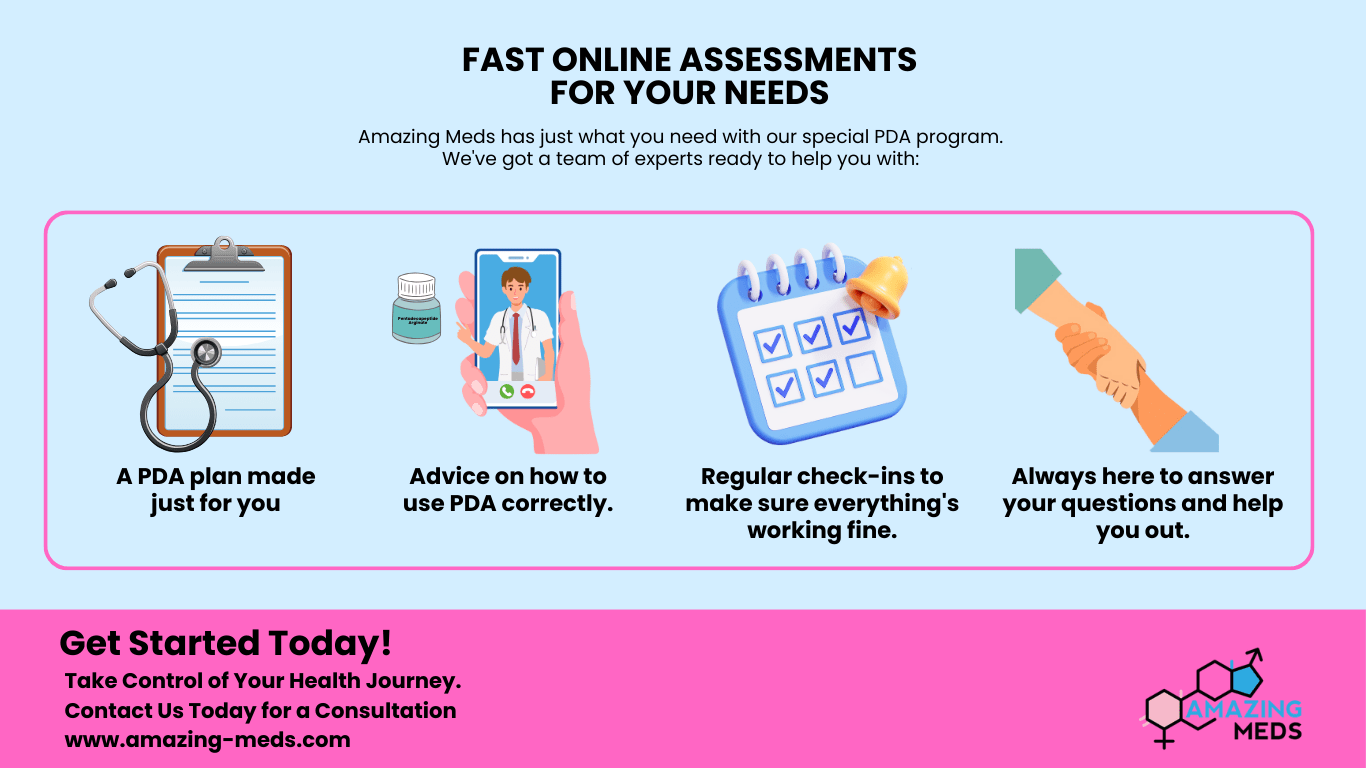
Frequently Asked Questions About BPC-157
How is BPC-157 made?
How does BPC-157 work in the body?
What conditions do people use BPC-157 to treat?
What are the main benefits of using BPC-157?
Can BPC-157 help with joint and muscle injuries?
How can BPC-157 be used in bodybuilding and sports?
What are the recommended dosages for BPC-157?
How should BPC-157 be administered for maximum efficacy?
Can BPC-157 be taken orally, or does it have to be injected?
How long does it take to see results from BPC-157?
Is BPC-157 legal, and can it be purchased freely?
Can BPC-157 be used in conjunction with other peptides or medications?
Are there any known contraindications for using BPC-157?
How does BPC-157 influence recovery from surgery or injuries?
Can BPC-157 help with conditions like arthritis or fibromyalgia?
What precautions should be taken while using BPC-157?
Is BPC-157 FDA-Approved?
Why is Pentadecapeptide Arginate (PDA) the perfect alternative to BPC-157?
Where can one find reputable sources of Pentadecapeptide Arginate (PDA)?
Talk to a Healthcare Provider First
Thinking about trying PDA? Always talk to a healthcare provider first.
Your health is unique, and a healthcare provider can give you advice that fits just you. They help make sure the choices you’re thinking about are safe and right for your health goals.
Seeing a healthcare provider is a smart move before starting any new supplement. They’re your partner in making good choices for your health.
So, before you decide, reach out to a healthcare provider. It’s a simple step that makes a big difference.

Amazing Meds: Doctor-Prescribed PDA, the #1 BPC-157 Alternative
Looking for the healing benefits of BPC-157 but want something high quality and legal? Amazing Meds has just what you need with our special PDA program.
We’ve got a team of experts ready to help you with:
Quick online checks and tests to figure out what you need.
- A PDA plan made just for you.
- Advice on how to use PDA correctly.
- Regular check-ins to make sure everything’s working fine.
- Always here to answer your questions and help you out.
And we only get our PDA from pharmacies we trust, so it’s always safe and top-notch.
Don’t risk your health with iffy BPC-157 sources. Come to Amazing Meds for PDA, a cutting-edge option for better health.
Ready to feel better with PDA? Contact Amazing Meds now and get started on your path to healing!
What is BPC-157? A Visual Summary
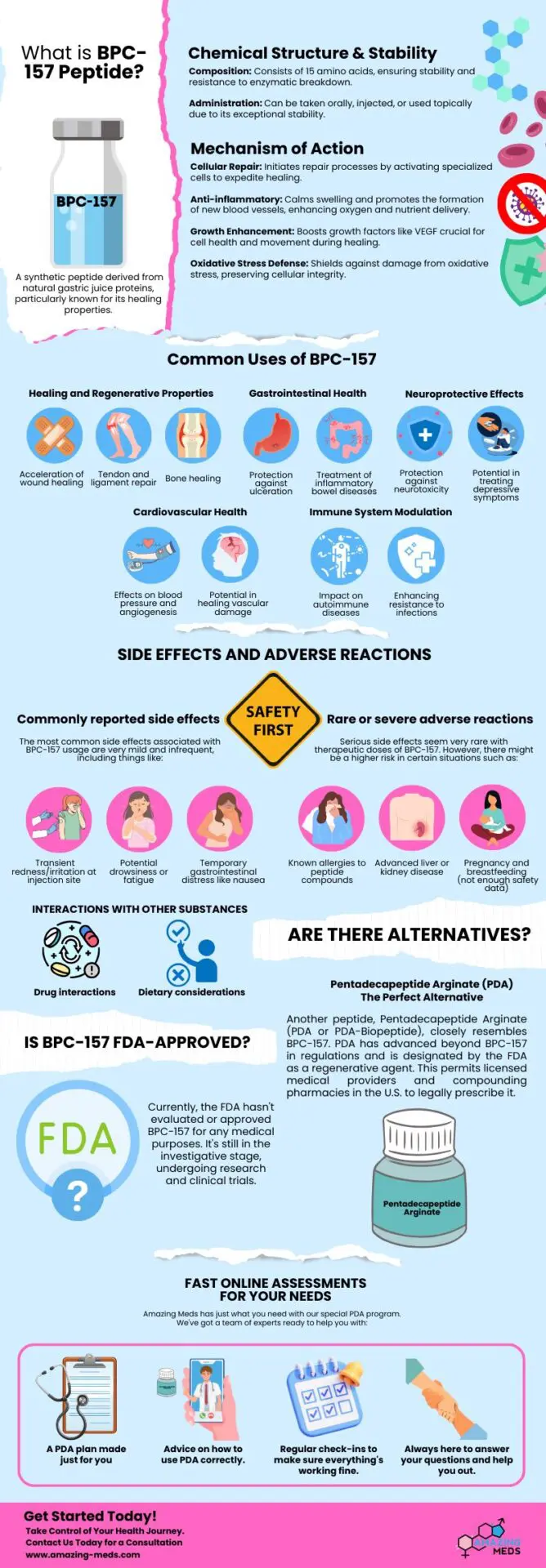
References
- Predrag Sikirić, Sven Seiwerth, Željko Grabarević, Rudolf Ručman, Marijan Petek, Vjekoslav Jagić, Branko Turković, Ivo Rotkvić, Stjepan Miše, Ivan Zoričić, Paško Konjevoda, Darko Perović, Ljubica Jurina, Jadranka Šeparović, Miro Hanževački, Branka Artuković, Mirna Bratulić, Marina Tišljar, Miro Gjurašin, Pavao Miklić, Dinko Stančić-Rokotov, Zoran Slobodnjak, Nikola Jelovac, Anton Marović, The influence of a novel pentadecapeptide, BPC 157, on NG-nitro-l-arginine methylester and l-arginine effects on stomach mucosa integrity and blood pressure, European Journal of Pharmacology, Volume 332, Issue 1, 1997, Pages 23-33, ISSN 0014-2999
- He L, Feng D, Guo H, Zhou Y, Li Z, Zhang K, Zhang W, Wang S, Wang Z, Hao Q, Zhang C, Gao Y, Gu J, Zhang Y, Li W, Li M. Pharmacokinetics, distribution, metabolism, and excretion of body-protective compound 157, a potential drug for treating various wounds, in rats and dogs. Front Pharmacol. 2022 Dec 14;13:1026182. doi: 10.3389/fphar.2022.1026182. PMID: 36588717; PMCID: PMC9794587.
- Brcic L, Brcic I, Staresinic M, Novinscak T, Sikiric P, Seiwerth S. Modulatory effect of gastric pentadecapeptide BPC 157 on angiogenesis in muscle and tendon healing. J Physiol Pharmacol. 2009 Dec;60 Suppl 7:191-6. PMID: 20388964.
- Vukojević J, Vrdoljak B, Malekinušić D, Siroglavić M, Milavić M, Kolenc D, Boban Blagaić A, Batelja L, Drmić D, Seiverth S, Sikirić P. The effect of pentadecapeptide BPC 157 on hippocampal ischemia/reperfusion injuries in rats. Brain Behav. 2020 Aug;10(8):e01726. doi: 10.1002/brb3.1726. Epub 2020 Jun 18. PMID: 32558293; PMCID: PMC7428500.
- Huang T, Zhang K, Sun L, Xue X, Zhang C, Shu Z, Mu N, Gu J, Zhang W, Wang Y, Zhang Y, Zhang W. Body protective compound-157 enhances alkali-burn wound healing in vivo and promotes proliferation, migration, and angiogenesis in vitro. Drug Des Devel Ther. 2015 Apr 30;9:2485-99. doi: 10.2147/DDDT.S82030. PMID: 25995620; PMCID: PMC4425239.
- Chang CH, Tsai WC, Lin MS, Hsu YH, Pang JH. The promoting effect of pentadecapeptide BPC 157 on tendon healing involves tendon outgrowth, cell survival, and cell migration. J Appl Physiol (1985). 2011 Mar;110(3):774-80. doi: 10.1152/japplphysiol.00945.2010. Epub 2010 Oct 28. PMID: 21030672.
- Sebecić B, Nikolić V, Sikirić P, Seiwerth S, Sosa T, Patrlj L, Grabarević Z, Rucman R, Petek M, Konjevoda P,
- Jadrijević S, Perović D, Slaj M. Osteogenic effect of a gastric pentadecapeptide, BPC-157, on the healing of segmental bone defect in rabbits: a comparison with bone marrow and autologous cortical bone implantation. Bone. 1999 Mar;24(3):195-202. doi: 10.1016/s8756-3282(98)00180-x. PMID: 10071911.
- Sikiric P, Hahm KB, Blagaic AB, Tvrdeic A, Pavlov KH, Petrovic A, Kokot A, Gojkovic S, Krezic I, Drmic D, Rucman R, Seiwerth S. Stable Gastric Pentadecapeptide BPC 157, Robert’s Stomach Cytoprotection/Adaptive Cytoprotection/Organoprotection, and Selye’s Stress Coping Response: Progress, Achievements, and the Future. Gut Liver. 2020 Mar 15;14(2):153-167. doi: 10.5009/gnl18490. PMID: 31158953; PMCID: PMC7096228.
- Park, Jong & Lee, Ho & Sikiric, Predrag & Hahm, Ki. (2020). BPC 157 Rescued NSAID-cytotoxicity Via Stabilizing Intestinal Permeability and Enhancing Cytoprotection. Current Pharmaceutical Design. 26. 10.2174/1381612826666200523180301.
- Vukojevic J, Milavić M, Perović D, Ilić S, Čilić AZ, Đuran N, Štrbe S, Zoričić Z, Filipčić I, Brečić P, Seiverth S, Sikirić P. Pentadecapeptide BPC 157 and the central nervous system. Neural Regen Res. 2022 Mar;17(3):482-487. doi: 10.4103/1673-5374.320969. PMID: 34380875; PMCID: PMC8504390.
- Sikiric P, Separovic J, Buljat G, Anic T, Stancic-Rokotov D, Mikus D, Marovic A, Prkacin I, Duplancic B, Zoricic I, Aralica G, Lovric-Bencic M, Ziger T, Perovic D, Rotkvic I, Mise S, Hanzevacki M, Hahn V, Seiwerth S, Turkovic B, Grabarevic Z, Petek M, Rucman R. The antidepressant effect of an antiulcer pentadecapeptide BPC 157 in Porsolt’s test and chronic unpredictable stress in rats. A comparison with antidepressants. J Physiol Paris. 2000 Mar-Apr;94(2):99-104. doi: 10.1016/s0928-4257(00)00148-0. PMID: 10791689.
- Hsieh MJ, Lee CH, Chueh HY, Chang GJ, Huang HY, Lin Y, Pang JS. Modulatory effects of BPC 157 on vasomotor tone and the activation of Src-Caveolin-1-endothelial nitric oxide synthase pathway. Sci Rep. 2020 Oct 13;10(1):17078. doi: 10.1038/s41598-020-74022-y. PMID: 33051481; PMCID: PMC7555539.
- Keremi B, Lohinai Z, Komora P, Duhaj S, Borsi K, Jobbagy-Ovari G, Kallo K, Szekely AD, Fazekas A, Dobo-Nagy C, Sikiric P, Varga G. Antiinflammatory effect of BPC 157 on experimental periodontitis in rats. J Physiol Pharmacol. 2009 Dec;60 Suppl 7:115-22. PMID: 20388954.

